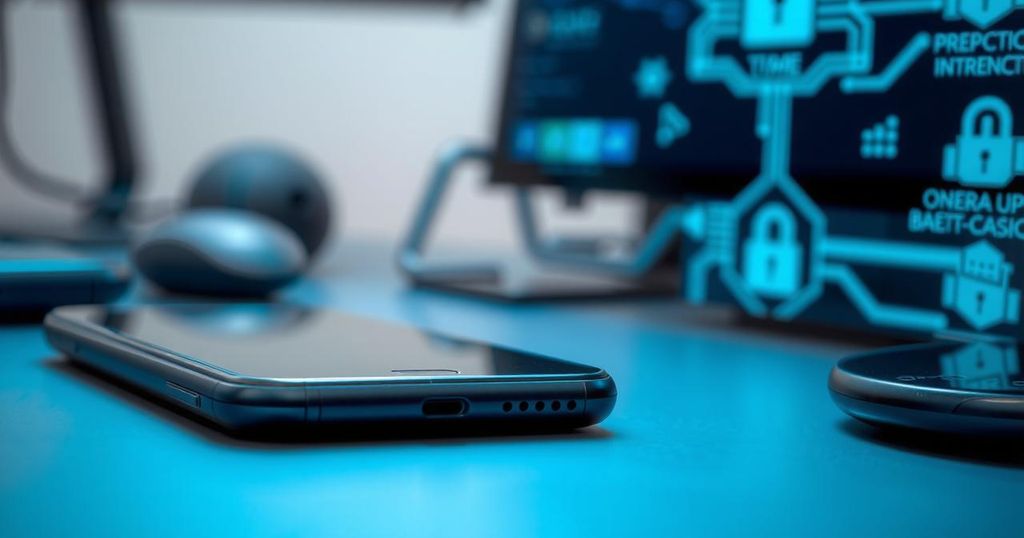Cybersecurity experts are sounding the alarm over a wave of sophisticated cyberattacks targeting smartphones, particularly those belonging to individuals in government and related sectors. A recent report highlights vulnerabilities that allow hackers to infiltrate devices unnoticed. With incidents involving impersonations and potential breaches of sensitive data, the urgency for enhanced cybersecurity measures is clear, particularly against growing threats from China.
Cybersecurity researchers have recently identified an alarming trend concerning smartphone security. A series of strange software crashes began hitting a select group of smartphones, specifically targeting users in government, tech, journalism, and politics. These issues, stretching from late last year into 2025, seemed to signal a significant cyberattack. Incredibly, this attack may have granted hackers easy entry into devices without any user interaction.
The hackers behind this operation have kept their identities under wraps, but there’s a pattern among the victims linked by their prior experiences with Chinese cyber offenders. Many of these individuals work in areas of interest to the Chinese government, suggesting a specialized focus by hackers. Increasingly, experts have pointed out that foreign hackers are viewing smartphones and their associated apps as soft targets in U.S. cybersecurity.
Experts warn about the growing vulnerability of mobile devices. According to a former cybersecurity expert at the National Security Agency and now COO of iVerify, Rocky Cole, the situation is dire. “The world is in a mobile security crisis right now. No one is watching the phones,” he stated. U.S. intelligence has reflected on the pressing threat China poses, particularly concerning its espionage campaigns targeting American phones and telecommunication networks.
In a stark message issued by U.S. authorities in December, they highlighted a Chinese-led hacking initiative aimed at accessing private communications, including text messages and phone calls, from a diverse range of Americans. Representative Raja Krishnamoorthi emphasized the severity, claiming that the hackers were indeed capable of intercepting calls and texts in real time.
There have even been reports of attempts to breach phones belonging to former President Donald Trump and his running mate during the 2024 election campaign. Meanwhile, the Chinese government has firmly denied these allegations and accused the U.S. of conducting its own damaging cyber activities. Lin Jian, spokesman for China’s foreign ministry, remarked on the U.S.’s unsavory tactics aimed at gathering intelligence abroad.
U.S. intelligence consistently includes China in its assessments of substantial threats, particularly due to the latter’s mastery of digital tactics such as disinformation and cyber-surveillance. Concerns around mobile networks run high, leading the U.S. and its allies to exclude Chinese telecom firms. Nevertheless, these firms still maintain ties to U.S. systems, raising alarms about possible cyber vulnerabilities.
Concerns are further compounded by smartphones’ extensive capabilities. Often seen as tech treasures, mobile devices can manage finances, control drones, and oversee power plants. The increased use of such technology hasn’t been matched by adequate security measures. The smartphones of government officials hold a wealth of sensitive data—potential targets for spooks and hackers alike.
The White House recently faced an incident where a hacker impersonated Susie Wiles, a trusted aide of Trump, to reach out to various political figures. Critics speculate on how a compromise could have provided unauthorized access to personal information. Meanwhile, while many devices come equipped with decent security, many apps and IoT devices lag behind on updates, leaving security holes that hackers could exploit.
This year, the federal government initiated a program to develop a “cyber trust mark” aimed at devices meeting security standards, but experts like Snehal Antani caution against complacency. Notably, she mentioned the discovery of vulnerabilities in even unexpected places, stating, “They’re finding backdoors in Barbie dolls”.
The central issue remains that device security is rendered ineffective if users do not adhere to basic protective measures. Multiple incidents showcase lapses of high-profile figures who inadvertently exposed sensitive communications.
For instance, Mike Waltz, who previously served under Trump, accidentally included a journalist in a top military discussions group. Similarly, Secretary of Defense Pete Hegseth utilized an improvised internet link to access the messaging platform Signal on an unauthorized computer. Experts assert that moments like these predictably provide openings for foreign actors to capitalize on lapses. In conclusion, national security measures must swiftly adapt to thwart these vulnerabilities to prevent compromising sensitive information.
Michael Williams from Syracuse University reinforced this point, asserting that while communication tools exist, the need for discretion is paramount. “We just can’t share things willy-nilly,” he urged.
In summary, the increasing incidence of sophisticated cyberattacks highlights the need for improved security measures for smartphones and applications, especially regarding sensitive communications. By targeting prominent figures, hackers are exposing vulnerabilities in U.S. cybersecurity. While initiatives like the ‘cyber trust mark’ seek to address these risks, user awareness and adherence to safety protocols remain critical in mitigating potential breaches. As experts urge caution, the unfolding narrative emphasizes the growing threat posed by foreign adversaries, particularly China, in the digital realm.
Original Source: www.al.com






